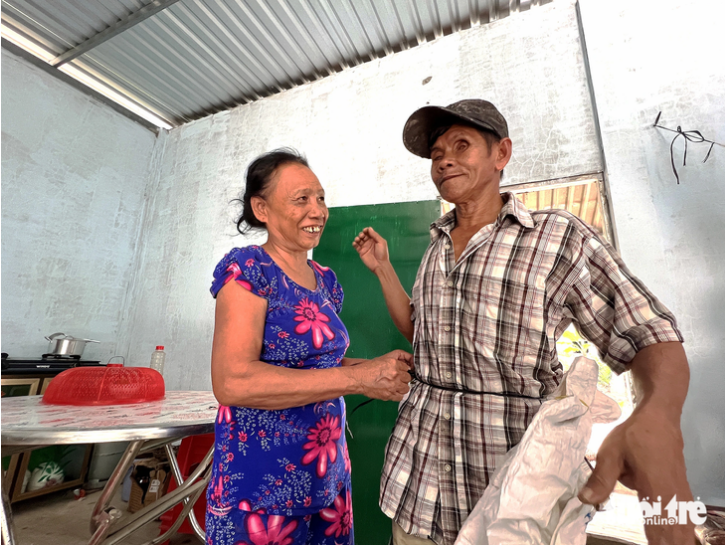However, what sets Hai apart from other fishermen is that he is blind!
A typical day for Hai starts with his wife guiding him to a small irrigation canal, located about half a kilometer away from their home.
She assists him in preparing his fishing equipment before he heads out to catch whatever he can.
Hai began losing his vision when he fell ill at the age of 30. His eyes got infected from pesticide spraying and suffered further damage when he was hit by rice while working as a hired worker in local paddies.
As his vision worsened and his wife aged, they realized that they could no longer work as hired workers and turned to fishing as a means of livelihood.
At present, Hai goes fishing about 10 days a month, usually during low tides. During the rest of the month, the tides are too high to catch anything.
Most of Hai’s fishing is done manually, with him reaching through the mud to catch small fish and snails.
He typically spends three to four hours on the water and catches around one kilogram of fish, which he sells to his neighbors for VND5,000-10,000 (US$0.2-0.4) each.
 |
| Hai and his wife care deeply for each other. Photo: Yen Trinh / Tuoi Tre |
According to his neighbors, Hai is the most skilled fisherman in the area.
On days when his wife is busy, he waits for a neighbor to guide him to the canal. Most of the time, he can find his way himself, but occasionally, he gets lost.
Hai rarely lets his disability hinder him.
“He is incredibly resourceful. He can fix broken furniture and cook meals on his own,” said his wife, Thach Thi Tha. She mentioned that the two of them rarely argue and even joke about his blindness.
“Once, I told him that we might not meet in our next life, and he responded, ‘Are you crazy? I won’t be blind in the next life. My eyes will be bright, and I’ll take care of you!’” she shared.
Tha is grateful for the love Hai shows not only to her but also to her family.
When her father was diagnosed with severe pneumonia, Hai took care of him as if he were his own father.
“At that time, I was too sick to do anything. Hai would boil warm water to clean my father’s body and spoon-feed him porridge every day.
“He even gave all our meat to my father, hoping he would recover. My father passed away three years ago, but Hai often says that if he were still alive, he would be happy living with him in our house,” Tha said.
Hai also tirelessly cares for his 54-year-old paralyzed brother-in-law.
Of course, Hai also deeply cares for his own family. Whenever he has money, he takes a motorbike taxi to visit his parents and brings them meat and fish.
 |
| The couple misses their daughter who lives far away. Photo: Yen Trinh / Tuoi Tre |
Despite their impoverished condition, Hai encouraged his daughter to finish high school and go to university. Although his daughter eventually dropped out to work and support the family, he still dreams of being able to provide for them without financial strain.
“I still dream of regaining my eyesight someday so that I can take some burden off my family,” he shared.
He also dreams of earning enough money to dredge a stagnant canal behind their house, pay off debts, and take care of his wife and brother-in-law.
As a gesture of gratitude towards those who have helped him and his family, Hai often treats their sprained joints or offers them massages and acupressure.
“I used to study oriental medicine in Ho Chi Minh City, so I want to help my neighbors in some way. I do it for free,” Hai said.
Hua Van Khuong, the chairman of the Red Cross Society in Ke Sach District, Soc Trang Province, where Hai and his wife reside, stated that Hai’s family is one of the most disadvantaged in the district.
Hai is a kind-hearted man who takes care of his family on a daily basis. The district provides his family with rice and essential supplies worth around VND400,000 ($16.4) per month, added Khuong.




